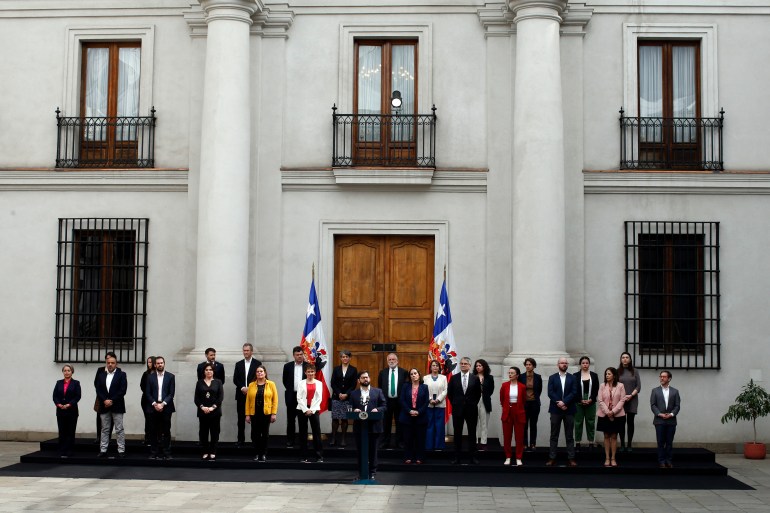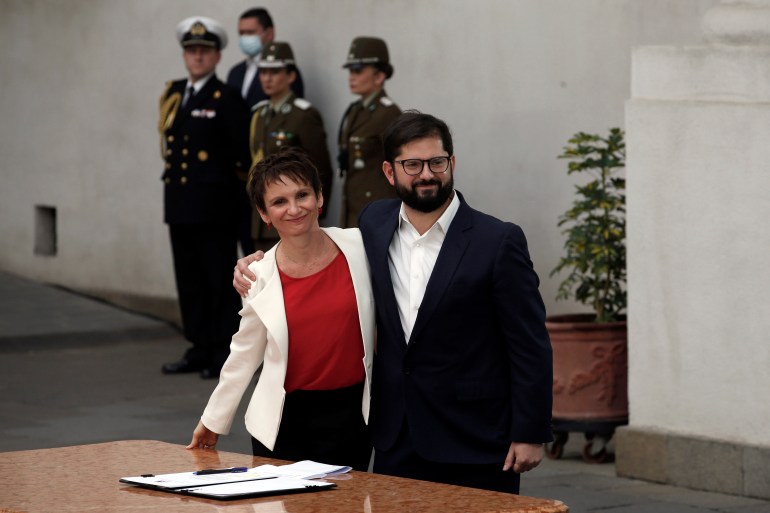President Gabriel Boric changes leadership of six ministries in first cabinet shake-up since he took office in March.
Chile’s President Gabriel Boric has shaken up his cabinet, less than 48 hours after he was dealt a resounding blow when citizens overwhelmingly rejected a new progressive constitution he had championed.
Boric, 36, changed the leadership of six government ministries on Tuesday in the first cabinet shake-up since he became Chile’s youngest president in March.
“I’m changing this cabinet, thinking about our country,” said Boric, qualifying the changes as “painful but necessary”.
“This is, maybe, I don’t think I have to hide it, one of the most politically difficult moments that I’ve had to face,” he added.
The shake-up does not come as a surprise, as Boric, who had been a big proponent of adopting the proposed constitution, had previewed there would be changes coming to his administration during a televised address on Sunday night.

He addressed the nation shortly after the referendum results showed Chileans had voted overwhelmingly against the proposed constitution.
Nearly 62 percent of voters rejected the text, which was set to replace a Pinochet-era Magna Carta, compared with almost 80 percent who voted to draft a new one in 2020.
Izkia Siches, the former interior minister, was the biggest name to leave the cabinet but probably the most expected as her tenure had been marked by controversy. Carolina Toha is taking her place.
Another strong Boric ally, Giorgio Jackson, was removed from the post of secretary general of the presidency and will take on the role of social development minister; Ana Lya Uriarte is taking his place. Boric also swore in new health, energy and science ministers.
Meanwhile, hundreds of student protesters demanding a new constitutional convention amassed outside La Moneda presidential palace before the cabinet reshuffle on Tuesday. Police dispersed them with water cannons and tear gas.
Boric said he plans to draft a new constitution with support from Congress and other political factions.
The opposition had said they were expecting changes to Boric’s team, with some conservative leaders refusing to meet with the president to begin talking about a new constitutional process until there was a change in his government.

Although polls had predicted Chileans would vote against the proposed constitution, the 24-point margin of victory for the rejection camp was a shocking repudiation of a document that was three years in the making.
“We must listen to the voice of the people and walk alongside the people,” Boric said.
The process of writing the constitution that Chileans rejected on Sunday began in 2019 when the country exploded in student-led protests, sparked by a hike in public transportation prices that quickly morphed into broader demands for greater equality and more social protections.
The following year, just less than 80 percent of Chileans voted in favour of changing the constitution.
Then in 2021, they elected delegates to a constitutional convention to write a new charter that would replace the one imposed by a military dictatorship led by General Augusto Pinochet 41 years ago.
Despite the rejection, political leaders on all sides, as well as Chileans as a whole, largely agree that the constitution needs to change, but it remains unclear how a new proposal will be written.
Whatever document the new convention comes up with is also likely to be far less ambitious than the 388-article proposed charter.
The charter draft characterised Chile as a plurinational state, would have established autonomous Indigenous territories, prioritised the environment and gender parity, and introduced rights to free education, health care and housing, among other issues.
Stay connected with us on social media platform for instant update click here to join our Twitter, & Facebook
We are now on Telegram. Click here to join our channel (@TechiUpdate) and stay updated with the latest Technology headlines.
For all the latest World News Click Here
